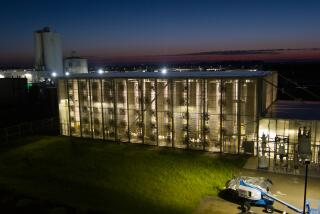Key Investor’s Agents Seize Biosphere 2
- Share via
In the red desert north of Tucson, off-duty federal marshals acting on behalf of Texas billionaire Edward P. Bass seized the Biosphere 2 project Friday, ousting the managers who conceived and constructed the $150-million, state-of-the-art surrogate planet.
“This is not an April Fool’s joke,” Biosphere public affairs director Chris Helms said. “It is a management dispute.”
The marshals served a temporary restraining order that Bass, a major investor in the sprawling experimental enclosed ecosystem, obtained in U.S. District Court for the Northern District of Texas. The order was issued against the senior managers of Space Biospheres Ventures, which operates the 3.15-acre complex of interconnected geodesic domes, a glass pyramid and gift shops.
Bass also filed court papers to dissolve the joint venture between the Biosphere’s managing partner, Decisions Team Inc., and its financial partner, Decisions Investment Corp.
He is asking that all assets, which include the most highly publicized and controversial experiment ever conducted in Earth ecology, be placed in temporary receivership, according to court papers.
Bass was not available Friday to discuss the reasons for the court action, but he recently indicated that it was time for the project to start turning a profit.
Terrel Lamb, his media relations specialist, said that Bass intends to maintain the crew now inside the Biosphere, continue its ecology experiments and keep it open as a tourist park.
In a written statement, Bass said: “I am firmly committed to the ongoing progress of Biosphere 2 and to the developing science biospherics. . . . I am convinced that Biosphere 2 will continue to build on its previous achievements once the management reorganization and financial restructuring are complete.”
*
The Biosphere was designed to demonstrate that people sealed within a replica of Earth’s major habitats could be completely self-sufficient, generating their own oxygen, growing their own food and recycling all their waste in a perfect microcosm of Earth. The Biosphere contains its own rain forest, desert, savannah and ocean.
But almost from its inception, critics have raised questions about its management and the integrity of the research conducted there. The court action Friday was the most recent twist in a enterprise that some critics have said was more eco-entertainment than ecological science.
Since the early 1970s, the people behind Biosphere 2--John Allen, Margret Augustine, Mark Nelson and Bass--have been building a worldwide network of environmentally aware businesses and research centers.
Their investments include a 300,000-acre cattle and horse ranch based in western Australia; a 5,000-acre ranch near Derby, Australia; the Institute of Ecotechnics, a private ecological think tank based in London, and the Hotel Vajra, an environmentally friendly earthquake-proof hotel in Katmandu, Nepal.
Friday’s action caught one founding director in Canada, another in Japan, and a third, who recently completed a two-year stint inside the Biosphere, on his way to class in Tucson.
A spokeswoman for Bass said the restraining order was a precaution to keep anyone from damaging the project in reaction to the ouster.
The temporary restraining order served on employees Friday stated: “If the energy supplied to Biosphere 2 is cut, its doors are opened, or its computer systems are aborted, or other possible actions . . . are taken, much if not all of the scientific value of Biosphere 2 will be lost or impaired, and many assets of SBV will be destroyed, as well as loss of public goodwill which the venture will never recover.”
The senior employees and director reacted angrily and vowed to fight the restraining order and regain control of the project.
“We will fight the temporary restraining order as well as any other attempts to wrest control of Biosphere 2,” said Augustine, president of Space Biospheres Ventures, who is now barred from the project. “This is a case of a billionaire who plays at environmental concerns, but is stuck in the ‘80s era of greed.”
Allen, a second ousted director, said in a statement Friday: “Biosphere 2 represents not only a financial investment but an unsurpassed investment of the world’s intellectual capital. I’m not going to stand by and let the life’s work of hundreds of creative people be stolen by a billionaire’s takeover attempt to make super profits.”
John B. Corliss, the Biosphere director of research, did not respond to requests for comment. Corliss, a respected scientist, left the National Aeronautics and Space Administration last year to join the project in part to bolster its flagging scientific credibility after the project’s scientific advisory board resigned en masse.
Helms said Corliss would continue to oversee the Biosphere research efforts.
The investment by Bass, heir to a legendary Texas oil fortune, was to sustain the project through the end of the century, according to Allen.
But Bass had made it clear that Biosphere must begin covering its operating costs--and start down the path toward becoming a moneymaking venture.
“This is the end of the capital investment era (of the project),” Allen told The Times last month. “Our focus switches dramatically to production and marketing.”
*
Introduced this month was the $300 “Airtron,” a device camouflaged to look like a houseplant that traps and digests toxic air pollutants. Besides the Airtron--which is being sold through the mail--other planned spinoffs include the Wastetron, a system that uses aquatic plants to recycle human waste into a fertilizer. Space Biospheres Ventures, the entity that operates Biosphere 2, also expects to market a patented glazing method that allows glass to be tightly bonded onto a steel frame, creating a virtually airtight and watertight structure.
In all, 12 U.S. patents on technology and inventions arising from the construction and operation of Biosphere 2 have been issued; seven more have been applied for.
Commercial exploitation of environmental technology was just one part of the marketing plan that first sold Bass on the project a decade ago.
It also called for a visitors center, which offers guided tours of the grounds for $12.95 per adult (there were 220,000 visitors in 1993), a 27-room hotel, a restaurant, a snack bar and parking facilities that include tram service. Plans include an environmentally friendly golf course.
More to Read
Sign up for Essential California
The most important California stories and recommendations in your inbox every morning.
You may occasionally receive promotional content from the Los Angeles Times.













